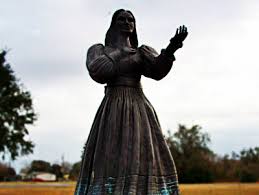Enter to win a copy of the new book
Soldier, Sister, Scout, Spy:
Women Soldiers and Patriots of the Western Frontier.

A slim shadow darted toward the old church at the ruined fortress of Goliad. The smell of smoke stained the night air as the figure picked a careful path through the rubble inside the fortress walls. Moonlight starkly displayed the damage caused by the retreating forces of Colonel James Fannin’s command. Hundreds of Fannin’s men now lay on the hard ground, prisoners of General Jose de Urrea, one of Supreme Commandant General Antonio Lopez de Santa Anna’s best commanders.
Pausing in a dark corner, Francita Alavez gazed toward the southwest gate and the dull gleam of a cannon positioned to fire on anyone who might attempt a rescue of the Americans. She shivered in the warm night as the knowledge of their fate bowed her shoulders. She knew what the captives did not. They believed they would be returned to the United States as prisoners of war. Francita had seen the order sent by Santa Anna to execute all of them.
As she had at Copano Bay almost the moment she arrived in Texas, Francita vowed to save as many as she could. On the eve of Palm Sunday, March 27, 1836, she slipped into the church and began the task.
“She had heard many tales of the bad, bold, immoral Texans, but like all good souls loath to think ill of others, scarcely believed they could be as bad as painted,” recounted the Pioneer Press in 1920. The article went on to outline what was then known about the woman who came to be called the “Angel of Goliad.” Little more is known today about the young woman who worked against a dictator’s orders at the risk of her own life.
According to a written recollection of schoolteacher Elena Zamora O’Shea, who learned about Francita years later through a family connection, Francita—or Panchita, as she was sometimes called—had been orphaned when young. A well-to-do family near San Luis Potosoi in Mexico raised the girl. O’Shea said that Francita was a sort of “better-class servant, of good blood and from a fine family.”
O’Shea went on to describe Francita as a “pretty, attractive, loving girl chafing at her position in this family and longing to be free and to have a fling at life.” Succumbing to the charms of the dashing Captain Telesforo Alavez, whom she knew to be married, Francita, “throwing all restraint aside went off with him to Texas in the campaign.”
Francita’s first encounter with the cruelties of war came at Copano. Mexican troops had just captured about seventy-five to eighty men after they had disembarked at the port. The Americans had come with William P. Miller from Nashville, Tennessee, to aid in the fight for liberty in Texas, then a part of Mexico. They were captured without arms and taken back to Copano.
To learn more about Francita Alavez and other such patriots read
Soldier, Sister, Scout, Spy:
Women Patriots and Soldiers on the Western Frontier.

